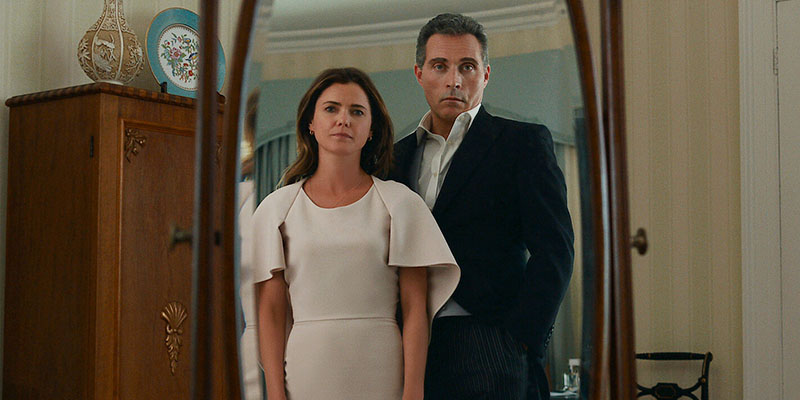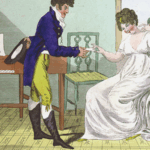The mix of political maneuvering, terrorism, murder and the volatile dynamics of marriage makes for great thrillers. The TV series “House of Cards” very well might have perfected this recipe.
Now comes “The Diplomat,” which at times plays like “Scenes From a Marriage” mixed with “Jack Ryan.” The eight-episode Netflix series, which debuted April 20 and hopefully will see a second season because of how effective it is and also because it ends with a cliffhanger, is the latest in a bunch of new political thrillers like “The Night Agent” that plays to the strengths of the genre while subverting it, not unlike the 2022 series “The Old Man.”
Instead of the patented globe-hopping thrills of “Jack Ryan,” we get a story that’s thrilling in part because of how restrained it is, but also because it’s very nearly a marital comedy-drama.
In other words, “Who’s Afraid of Virginia Woolf,” leavened by not only by sarcastic quips but drama in the highest circles of British and American politics.
It’s hard not to read some of the characteristics of any romantic relationship into “The Diplomat,” and it often seems like a play on the marriage of Hillary and Bill Clinton: She’s tough as nails, he’s smooth as silk — and trust issues abound.
The classics of political intrigue
We’re lucky to live in an age of political thrillers. (The fictional kind, that is.) In the past 60 years, there’s a long list of great thrillers with a political bent.
Sometimes they play out like stark stage dramas: In 1964, “Seven Days in May” cast a coldly calculating general (played by Burt Lancaster) against another military man (Kirk Douglas) with the fate of democracy in the United States in play. Lancaster’s general schemes to stage a coup against the president, played by Frederic March, for being too soft on Russia. Director John Frankenheimer brings much of the same realistic detail and nerve-wracking tension as he had two years earlier in his better-known film “The Manchurian Candidate.”
In 1974, director Alan J. Pakula released a classic political thriller, “The Parallax View,” about a journalist (Warren Beatty) who discovers a political plot following the assassination of a presidential candidate. Only a couple of years later, Pakula directed what is perhaps the best and most realistic (for good reason) political thriller of all time, “All the President’s Men.”
Between “Parallax” and “All the President’s Men” came director Sydney Pollack’s classic political thriller “Three Days of the Condor.”
In some ways, “Three Days of the Condor” is the prototype for the political thrillers we regularly see offered on our streaming services today. “Condor” had something that the earlier films did not: a strong female lead in Faye Dunaway.
But even “Condor” didn’t elevate the female lead into the kind of role that modern-day thrillers routinely do. There certainly have been legal or political thrillers with strong female leads, like “The Pelican Brief” in 1993, starring Julia Roberts. But few have made the male and female lead characters virtual equals, amping up the drama inherent in the different points of view of men and women.
Then came two television series: “The Americans” and “House of Cards.”
“The Americans,” which debuted on FX in 2013, was a prestige TV series to rival “Breaking Bad.” Keri Russell and Matthew Rhys played the Jennings, a 1980s suburban couple with two kids and a friendly neighbor. But the Jennings couple are deep-undercover Russian spies and their neighbor, played by the always-great Noah Emmerich, is an FBI agent.
There was plenty of tension to be had in “The Americans” and much of it centered on the Russian spies’ missions in the United States. But a lot of the tension was related to American family life, including raising children who don’t know your life is a lie and maintaining a marriage that both husband and wife know is a lie. Except when it isn’t a lie.
Russell is well-remembered as the steely-eyed agent who effectively ran the operation – er, the family – which is part of what makes her presence in “The Diplomat”— all steel and frustration and sarcasm —so rewarding.
“House of Cards,” also released in 2013, albeit on Netflix, offered a similar character with a spine of steel, Claire Underwood (played by Robin Wright), but this time she was dealing with her incredibly slippery husband, Frank Underwood (played by since-disgraced Kevin Spacey).
Those characters are translated, in some ways, into “The Diplomat.”
Of agents and old men
It wouldn’t be appropriate to talk about recent political thrillers without citing two big hits and two qualified successes.
The hits: “Homeland” and “Jack Ryan” very nearly perfected the international political thriller. For eight seasons beginning in 2011, “Homeland” followed a strong female lead (a CIA officer played by Claire Danes) as she ran inference with plots against the United States, represented early on by war hero Nicholas Brody (Damien Lewis).
“Jack Ryan,” based on Tom Clancy’s books about the titular CIA analyst turned man of action, has aired for three seasons on Amazon Prime Video. John Krasinski plays Ryan, Wendell Pierce as James Greer, Ryan’s one-time boss and later partner, and Michael Kelly as Mike November, a twist on his “fixer” role in “House of Cards.” A series of movies, highlighted by the first, “The Hunt for Red October,” is more uneven in quality than the (so far) three-season streaming series.
Not as big a hit as “Jack Ryan” or “Homeland” was “The Old Man,” a 2022 FX series with Jeff Bridges as a retired government operative dragged into a fight for his life against his old friend and boss, played by John Lithgow, and “The Night Agent,” a 2023 Netflix series that seems like a mix of “Jack Ryan” and “The Diplomat” with training wheels.
“The Night Agent” is undeniably appealing and a big part of that is that it emphasizes an ensemble cast featuring two leads, Gabriel Basso as Peter Sutherland, the titular night agent, and Luciane Buchanan as Rose Larkin, who gets caught up in intrigue after she’s targeted by killers. Sutherland, as square-jawed a hero as you’d hope to find, comes to the rescue. But Larkin is – while being a complete novice to intrigue – much more capable than the character would have been in a series developed a few years ago. Sure, Larkin is overmatched by all the killers, but she knows it and isn’t afraid to wisecrack.
The characters and story of “The Diplomat” feel like a distilled version of all these shows, smoothly refined.
With a chaser: “Spinal Tap” actor Michael McKean as the president of the United States.
‘The Diplomat’ is about relationships between people and nations
There’s a lot to like about “The Diplomat,” recently released on Netflix, and the cast is chief among its strong points. Keri Russell, who for some of us always be the cool and on-task agent of “The Americans,” is excellent as Kate Wyler, newly-appointed U.S. ambassador to Great Britain. Rufus Sewell, so chilling in “The Man in the High Castle,” plays Hal Wyler, her husband, a former ambassador.
When the president, played by McKean as a Biden-ish commander in chief, sends her to London, she finds herself in the middle of political controversy: An international power, assumed to be Iran, has attacked a British warship. The prime minister (played by Rory Kinnear) is goaded into declaring that he will rain “hellfire” on the responsible parties.
But while Kate is still finding her footing as ambassador, Hal comes onto intelligence that Iran isn’t responsible for the attack. Over the course of several episodes, Kate and Hal, working with allies both American and British, try to determine the real attacker and keep the PM – and the American president – from going off the deep end.
All the while, Kate is concerned that she can’t trust Hal and, by extension, the intelligence he’s passing along.
There’s precious little Jack Ryan-ing here. There’s no running across rooftops or gunplay for Kate or Hal. The biggest physical altercation I can think of is between the Wylers themselves.
Instead, the series is all about several complicated dances that are going on simultaneously in the complicated relationships between Kate and Hal, between the two of them and the prime minister, between Kate and the incredibly sharp American deputy chief of mission (played by Ato Essandoh) and CIA station chief (Ali Ahn) and between Kate and the hot foreign secretary (David Gyasi).
The series was created by Debora Cahn, who was showrunner on “Homeland” in its final couple of seasons, and her pedigree includes time as a writer and producer in the last four seasons of “The West Wing,” which only occasionally had gunfire break out but did weave storylines and relationships for a White House full of great characters.
I think it’s likely that “The Diplomat” would have been a very different series if the lead character were not a woman: Much more shooting people in the kneecaps and swooping helicopters. Not to mention the unlikelihood of a straight and macho series casting McKean as the president.
Instead we get a straightforward story of the joys and perils of marriage and a working marital relationship that plays out against a backdrop of political intrigue.
Forbes wrote on April 26 that a second season of “The Diplomat” has not yet been announced, although its apparent high rate of viewership might bring a resolution to that cliffhanger. I only hope that a second season similarly forgoes shootouts and continues the focus on complicated relationships between woman and men as well as those between nations.

















